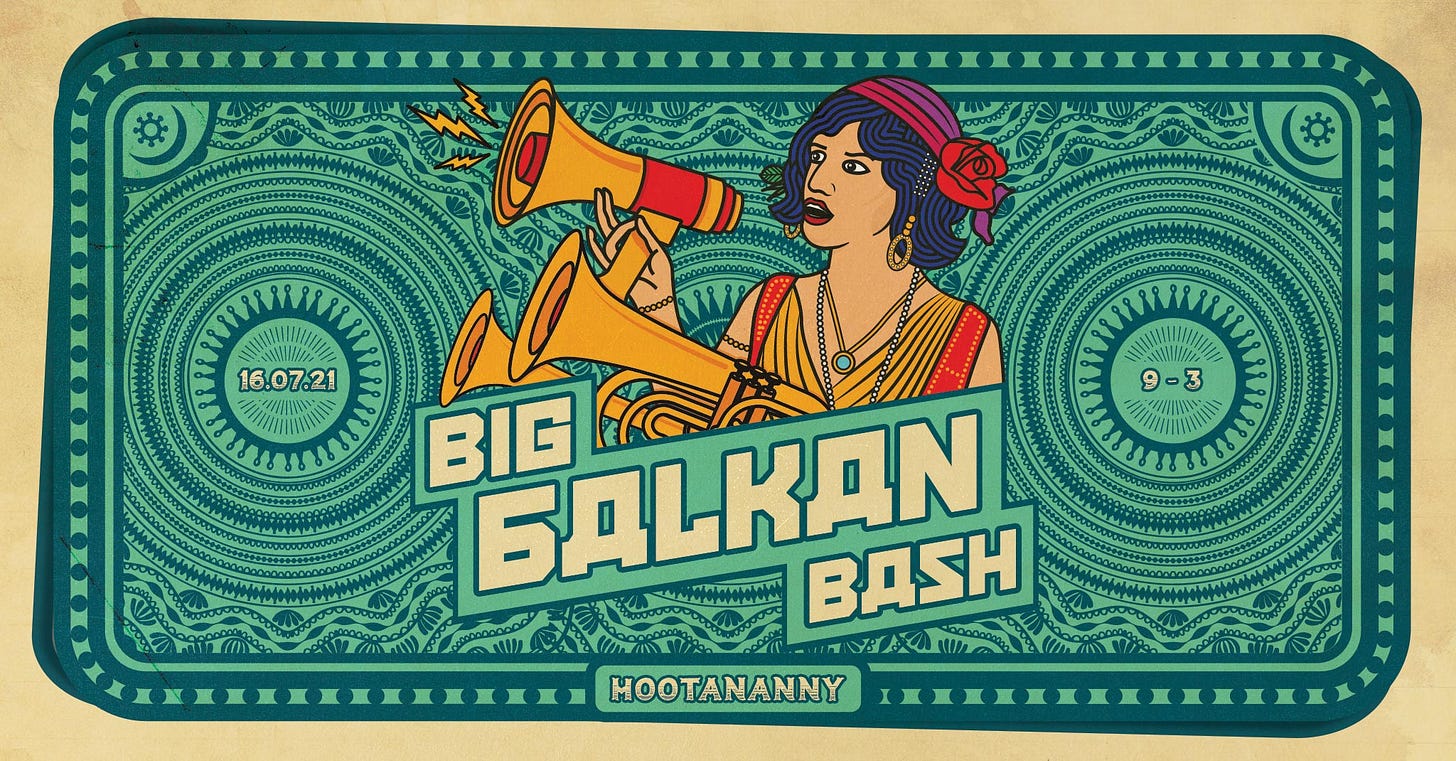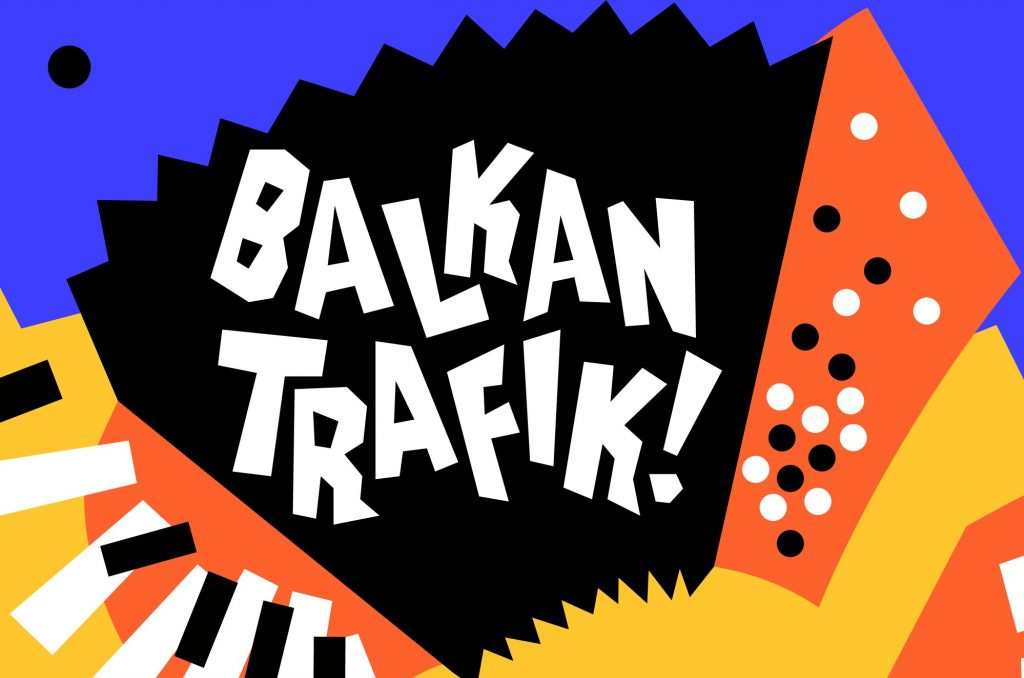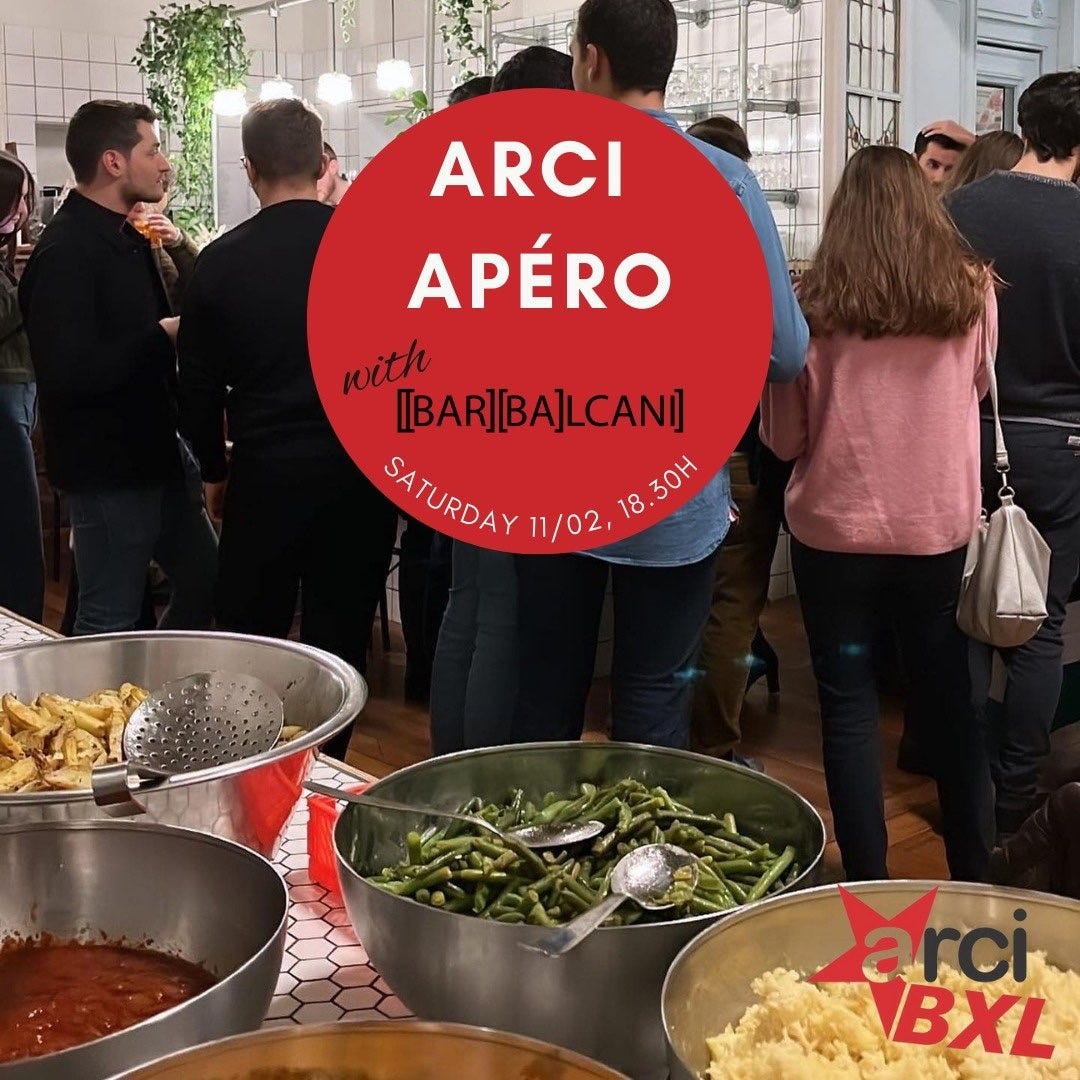S3E13. What is this obsession with Balkan music?
From London to Brussels, Balkan-themed events and festivals are spreading throughout Europe. On the notes and rhythm of accordions and trumpets, we try to trace the essence of this (non) musical genre
Hi,
welcome back to BarBalkans, the newsletter (and website) with blurred boundaries.
From London to Milan, from Dublin to Berlin and Lyon.
Balkan-themed parties, events and festivals are spreading throughout Europe, bringing more and more fans or just curious people to sing and dance on the Gypsy and folk notes of accordions and trumpets.
With a very brief search on Google, we can find at least a dozen dates in the first four months of 2023.
From Balkan Caravan in Mezzago (in Northern Italy) on January 5 to the great Balkan Trafik in Brussels between April 27 and 30.
This is why we have to ask ourselves: where does this “obsession” with Balkan music come from?
But also, what is Balkan music?
"Balkan music" is everything and its opposite
We can start from here. What is this Balkan music?
Someone goes wild with the incessant rhythm of Balkan Beats. Someone weeps listening to the heartbreaking sevdah. Someone immediately thinks about trashy turbofolk.
In short, “Balkan music” really is everything and its opposite.
As if we talk about “British music”, “Italian music”, “European music”. We can find some common traits, but the word cannot explain exactly its meaning.
So we have to start again. How many “Balkan genres” are there?
Balkan music has experienced great popularity in particular thanks to Bosnian musician and composer Goran Bregović and German producer and DJ Shantel.
Folk songs mixed with rock, pop and dance, Gypsy sounds and incessant, asymmetrical rhythms of violins, accordions, trumpets and saxophones.
This is Balkan Beats, that reached its peak of popularity in the early 2000s.
This is only the beginning. If we scratch the surface, we realize the complexity of a (non) genre, that we know far too little.
For example, one of Balkan musical movements is sevdalinka (or sevdah), a sort of saudade.
An expression of melancholy, love and amorous yearning, part of folk traditions and reinterpreted also by new generations.
Then, there is Yugo Rock, that contains most of the musical productions from the Seventies to the breakup of Yugoslavia in the early Nineties.
When we talk about Yugo Rock, we refer to an almost endless framework of musical genres: from rock ‘n roll to post-punk, from electro-pop to arabesque sounds. Different sides of the same successful pop phenomenon, that can only be remembered with a bit of Jugonostalgia.
The musical calm before the storm of ethnic wars.
We have to mention the controversial turbofolk, which mixes a good dose of glitter and trash with questionable socio-political relationships.
Rooted in 1980s Serbia, it became the musical reference of Slobodan Milošević’ regime in the decade of fratricidal wars.
It seemed a popular rejection of Yugo Rock cosmopolitan experiments, as shown by the success of singers like Svetlana Ražnatović (aka Ceca), the wife of war criminal and leader of the Arkan Tigers, Zeljko Raznatović.
In the 2000s turbofolk is still an expression of exasperatingly trashy pop, characterized by autotune, lyrics with any depth of meaning, status symbols and plastic surgery.
But in the end, when we think about Balkan music, we come back here.
To the gypsy rhythms, the accordions, the violins. To the wild folk music, a bit rock and a bit pop, that makes us dance and sing out loud.
Why?
The reasons behind the success
Like all the irrational things, it is almost impossible to find the reason why the Balkan music is so successful. BarBalkans tried to look for an explanation, asking to some organizers of these events and festivals.
«It is the great energy and atmosphere that the music creates. There is some unique and special about it», Max Golfar, Head of Music & Events at Hootananny Brixton in London, explains. Here, he has been organizing Big Balkan Bash since 2019 (the last one was last night).
People who approach it for the first time discover «brilliant party music full of rich culture and unique sounds». In this way, there is «an air of curiosity at the events and a feeling of excitement for discovering something new».
Big Balkan Bash is a «Balkan-fusion party, with influence from not only the Balkans, but various kinds of Western folk music and electronic music», while Diskoteka Balkanska at SO36 in Berlin «celebrates Jewish Klezmer, the wide range of Roma and Sinti music and the diversity of Slavic folklore-inspired music».
The real game changer of these events are the people who participate. «They celebrate more exuberantly and more related to each other», the organizers of Diskoteka Balkanska - Klub Balkanska from 2008 to 2019 - tell BarBalkans.
«Absolutely wild and exuberant» parties, where local and international bands, DJs, and producers «use Eastern European folklore in their music» and where participants with a direct connection to the Balkans «feel that their musical homeland is valued».
And then there is «the fusion of genres, heard and felt at all levels» during the Balkan Trafik. The festival dedicated to the cultures of the countries of South-Eastern Europe, that has become a reference on the entire continent with its music, dance, workshops and associations.
«We highlight the richness of traditions and folklore, but also today’s urban styles: hip hop, rock, ska, punk, electro, always based on the musical roots of the region», Nicolas Wieërs, Producer and programmer of the Balkan Trafik, underlines.
Concerts, the Giant Horo (traditional dance) in the Grande-Place of Brussels, murals, foodtrucks and photo exhibitions. This is an outdoor festival, to «reach a younger audience that is totally complementary to the one that has followed us for 17 years».
The Festival «closely follows the cultural evolution» of the Balkans and «creates bridges with Brussels, as a multicultural capital». Wieërs stresses that «things have changed significantly» in the region and beyond: «We used to talk about the beauty of traditions, now about the emergence of talents on all artistic levels».
One root, countless genres
In order to fully explain the spirit of the Balkan music, we need to have a word with someone who actually plays this kind of music.
«Music is evolution, you always have to grow and look for new motivations. If we had stayed where we were, we would have been similar to many others. But now we have defined our own specific timbre and identity», Gabriele Roccato, singer and founder of Babbutzi Orkestar, tells BarBalkans.
Founded in 2007 by a group of musicians «to perform a gypsy concert at the wedding of two friends», the Babbutzi Orkestar has never stopped since then. In these 16 years of parties and concerts, «we have continually reinvented ourselves, to evolve the project».
As Roccato recalls, «we started as a classical Balkan orchestra, now we are a Balkan punk band». Even musicians and instruments have changed «according to the idea of music we have developed». For example, viola and violin are no longer necessary.
«We live for concerts, we are hungry for stages and parties». This is how memorable moments are being collected: from Carroponte (in Milan), «where we feel always at home», to BalkanBeats in London and Hıdrellez Festival in Turkey «with more than 10 thousand people listening to us».
Since 2013, Babbutzi Orkestar has also been developing another project in collaboration with Bloom in Mezzago (Monza and Brianza, Italy). Balkan Caravan, «not a classic concert, but a party and a caravan of people playing and dancing».
Roccato and the Babbutzi Orkestar kicked off a series of events «involving fortune-tellers, jugglers, dancers». All strictly Balkan-themed: «The participants are dressed in gypsy style and a caravan is transformed into a music box».
Talking to the frontman of the Babbutzi Orkestar, we come back to the almost existential question. What is this Balkan music?
«It has Indian roots, where the real gypsy was born, and then it evolved and found an identity in Eastern Europe. This is the popular music of the Balkans».
The bands that take this music around Europe «revisit the culture and identity of the peoples» of this part of the continent. But this is not all.
«What we are trying to do is to take its root and keep the sounds, mixing with other genres», Roccato explains. The Balkan Beat Box in the electronic Balkan, Boom Pam in the surf Balkan. And what about the Babbutzi Orkestar?
«We are developing a punk nature, but we also combine other musical genres freely». For example, in the latest album Pornopunk (2021) there is space also for «reggaeton, rock, jazz and trap. Yes, even trap».
Because Balkan music is «a mix of many different genres, never losing the language and the original root», the frontman of Babbutzi Orkestar confirms.
After all, this is precisely why we love so much thex Balkan music.
Pit stop. Sittin’ at the BarBalkans
We have reached the end of this piece of road.
In this “obsession” with Balkan music, today our bar, the BarBalkans, turns into an agenda of the upcoming events all over Europe.
Following the dates in Dublin, Mezzago, London and Brussels, next Saturday (February 18) we should stay in the Belgian capital, for the Balkan Party at La Tricoterie.
On March 3, there will be both the Balkan Party at Ninkasi (Lyon) and Diskoteka Balkanska at SO36 (Berlin).
And it is already time to buy the tickets for the next Balkan Trafik, on April 27-30 in Brussels. The festival that cannot be missed for anything in the world!
In the meantime, thanks to Arci Bruxelles, tonight we will meet at the Elzenhof cultural centre for a chat about these two years and a half of BarBalkans project.
Here you can find all the details for a sort of Balkan apéro… where there will be the Balkan music that we continue to play, sing and dance!
Let’s continue the BarBalkans journey. We will meet again in two weeks, for the 14th stop.
A big hug and have a good journey!
Your support is essential to realize all that you have read. And even more.
Because a job well done - always aiming to improve - needs many hours and energy, also to keep BarBalkans newsletter free for everyone.
An independent project like this cannot survive without the support of the readers. For this reason I kindly ask you to consider the possibility of donating:
Every second Wednesday of the month you will receive a monthly article-podcast on the Yugoslav Wars, to find out what was happening in the Balkans - right in that month - 30 years ago.
You can listen to the preview of BarBalkans - Podcast on Spreaker and Spotify.
Pay attention! The first time you will receive the newsletter, it may go to spam, or to “Promotions Tab”, if you use Gmail. Just move it to “Inbox” and, on the top of the e-mail, flag the specific option to receive the next ones there.






